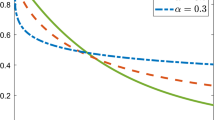Abstract
A time-fractional initial-boundary value problem of Fokker–Planck type is considered on the space-time domain \(\Omega \times [0,T]\), where \(\Omega \) is an open bounded domain in \(\mathbb {R}^d\) for some \(d\ge 1\), and the order \(\alpha (x)\) of the Riemann-Liouville fractional derivative may vary in space with \(1/2< \alpha (x) < 1\) for all x. Such problems appear naturally in the formulation of certain continuous-time random walk models. Uniqueness of any solution u of the problem is proved under reasonable hypotheses. A semidiscrete numerical method, using finite elements in space to yield a solution \(u_h(t)\), is constructed. Error estimates for \(\Vert (u - u_h)(t)\Vert _{L^2(\Omega )}\) and \(\int _0^t \left| \partial _t^{1-\alpha } (u-u_h)(s)\right| _1^2 \,ds\) are proved for each \(t\in [0,T]\) under the assumptions that the following quantities are finite: \(\Vert u(\cdot , 0)\Vert _{H^2(\Omega )}, |u(\cdot , t)|_{H^1(\Omega )}\) for each t, and \(\int _0^t [\Vert u(\cdot , t)\Vert _{H^2(\Omega )}^2 + |\partial _t^{1-\alpha }u|_{H^2(\Omega )}^2]\), where u(x, t) is the unknown solution. Furthermore, these error estimates are \(\alpha \)-robust: they do not fail when \(\alpha \rightarrow 1\), the classical Fokker–Planck problem. Sharper results are obtained for the special case where the drift term of the problem is not present (which is of interest in certain applications).
Similar content being viewed by others
References
Becker, L.C.: Resolvents and solutions of weakly singular linear Volterra integral equations. Nonlinear Anal. Theory Methods Appl. 74(5), 1892–1912 (2011)
Chen, H., Stynes, M.: Blow-up of error estimates in time-fractional initial-boundary value problems. IMA J. Numer. Anal. (to appear), 2020. Researchgate preprint (2020)
Diethelm, K.: The analysis of fractional differential equations, volume 2004 of Lecture Notes in Mathematics. Springer, Berlin. An application-oriented exposition using differential operators of Caputo type (2010)
Dixon, J., McKee, S.: Weakly singular discrete Gronwall inequalities. Z. Angew. Math. Mech. 66(11), 535–544 (1986)
Huang, C., Le, K.N., Stynes, M.: A new analysis of a numerical method for the time-fractional Fokker–Planck equation with general forcing. IMA J. Numer. Anal. 40(2), 1217–1240 (2020)
Jin, B., Lazarov, R., Zhou, Z.: Numerical methods for time-fractional evolution equations with nonsmooth data: a concise overview. Comput. Methods Appl. Mech. Eng. 346, 332–358 (2019)
Kian, Y., Soccorsi, E., Yamamoto, M.: On time-fractional diffusion equations with space-dependent variable order. Ann. Henri Poincaré 19(12), 3855–3881 (2018)
Le, K.N., McLean, W., Mustapha, K.: Numerical solution of the time-fractional Fokker–Planck equation with general forcing. SIAM J. Numer. Anal. 54(3), 1763–1784 (2016)
Le, K.-N., McLean, W., Stynes, M.: Existence, uniqueness and regularity of the solution of the time-fractional Fokker–Planck equation with general forcing. Commun. Pure Appl. Anal. 18(5), 2765–2787 (2019)
McLean, W.: Regularity of solutions to a time-fractional diffusion equation. ANZIAM J. 52(2), 123–138 (2010)
McLean, W., Mustapha, K., Ali, R., Knio, O.: Well-posedness of time-fractional advection–diffusion–reaction equations. Fract. Calc. Appl. Anal. 22(4), 918–944 (2019)
McLean, W., Mustapha, K., Ali, R., Knio, O.M.: Regularity theory for time-fractional advection–diffusion–reaction equations. Comput. Math. Appl. 79(4), 947–961 (2020)
Pedas, A., Vainikko, G.: On the regularity of solutions to integral equations with nonsmooth kernels on a union of open intervals. J. Comput. Appl. Math. 229(2), 440–451 (2009). Special Issue: Analysis and Numerical Approximation of Singular Problems (2009)
Straka, P.: Variable order fractional Fokker–Planck equations derived from continuous time random walks. Phys. A 503, 451–463 (2018)
Thomée, V.: Galerkin Finite Element Methods for Parabolic Problems. Springer Series in Computational Mathematics, vol. 25, 2nd edn. Springer, Berlin (2006)
Author information
Authors and Affiliations
Corresponding author
Additional information
Publisher's Note
Springer Nature remains neutral with regard to jurisdictional claims in published maps and institutional affiliations.
K.-N. Le: The research of this author is supported in part by the Australian Government through the Australian Research Council’s Discovery Projects funding scheme (Project Number DP170100605).
M. Stynes: The research of this author is supported in part by the National Natural Science Foundation of China under Grant NSAF-U1930402.
Rights and permissions
About this article
Cite this article
Le, KN., Stynes, M. An \(\alpha \)-Robust Semidiscrete Finite Element Method for a Fokker–Planck Initial-Boundary Value Problem with Variable-Order Fractional Time Derivative. J Sci Comput 86, 22 (2021). https://doi.org/10.1007/s10915-020-01375-x
Received:
Revised:
Accepted:
Published:
DOI: https://doi.org/10.1007/s10915-020-01375-x



